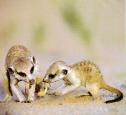 How do you know when you've taught someone something? This question is not easy to answer. Perhaps they coincidentally learned it on their own or picked it up from observing you. In those cases, can you really say that you taught them? I don't think so. So then, what exactly does it mean to teach?
How do you know when you've taught someone something? This question is not easy to answer. Perhaps they coincidentally learned it on their own or picked it up from observing you. In those cases, can you really say that you taught them? I don't think so. So then, what exactly does it mean to teach?The following news brief doesn't really address this issue but is provocative nonetheless. I'm not sure if the issue gets addressed in this NPR interview; I haven't heard it. I prefer to go to the original publication. Only those in privileged positions can access the publication online, and fortunately I am one of them so I can tell you they go with a definition from Marc Hauser, author of Wild Minds, a book I recommend.

To qualify as teaching, these criteria must be met:
1) the 'teacher' modifies its behavior only in the presence of a naive observer (the 'student')
2) the 'teacher' incurs some cost or at least no immediate benefit
3) the 'student' acquires knowledge or skills more rapidly than s/he would have otherwise
The only one I get stuck on is #2. I can understand the teacher has to expend at least some time/energy (a cost), but why does the teacher have to not immediately benefit from the activity? I know it says "or" and this might be the key to the definition.
Some primatologists think that chimps living in the Côte d'Ivore have taught their offspring how to crack nuts, which may be the case, but I've always wondered if this was only another case of observation learning rather than active teaching.
Let's take another look at this definition using a common example from West Africa, imagining I'm a chimp. If I'm not spending any extra time or effort on teaching someone, say I'm using some innovative technique to extract a highly nutritious and rare substance for myself in the presence of my young one (which happens often), then I would possibly be teaching if I do not immediately consume this delicacy. I would still have to use some other technique, one that I don't ordinarily use while eating this food (to satisfy #1), and my youngster would have to extract this item sooner than s/he would have if I had not altered my foraging behavior (to meet #3).

Evidently this is what meerkat parents have been observed doing - with scorpions.
****************************************************
Meerkat Parents Demo Life Lessons
July 13, 2006 — It's hardly algebra or physics, but meerkats have been observed actively teaching their young, something not often seen among animals in the wild.
While the young of many species learn by observing older members of their group, it's less common for adults to take direct actions with the only goal being teaching.
Researchers from the University of Cambridge in England observed meerkats gradually introducing cubs to prey, showing them how to handle captured insects and even removing the stingers from scorpions before giving them to youngsters.
"Although there are anecdotal reports of teaching in species from chimpanzees to killer whales, until this year solid evidence was really lacking," said Alex Thornton, co-author of the report appearing in the current issue of the journal Science.
There had also been evidence of teaching by cats, Thornton added, but that was hard to confirm because of the difficulty of studying large cats in the wild.
Meerkats are not related to cats. They are about a foot long plus an eight-inch tail and weigh about two pounds. They live in groups.
"Meerkats provide the ideal study species to examine these questions because they eat a whole range of prey items including lizards, geckos, scorpions, spiders and small mammals that are very difficult for young pups to handle," Thornton said.
While evidence of teaching has been rare, he said, "My feeling is that teaching is a lot more common than we had previously supposed. I think teaching is probably very common among species in which dependent young must learn complex skills. Teaching of hunting, for example, is likely to be common among felines, mongooses and birds of prey."
He also expects to see reports of teaching among insect societies.
"The important thing is to consider under what conditions we might expect one animal to actively promote learning in another," he said.



No comments:
Post a Comment